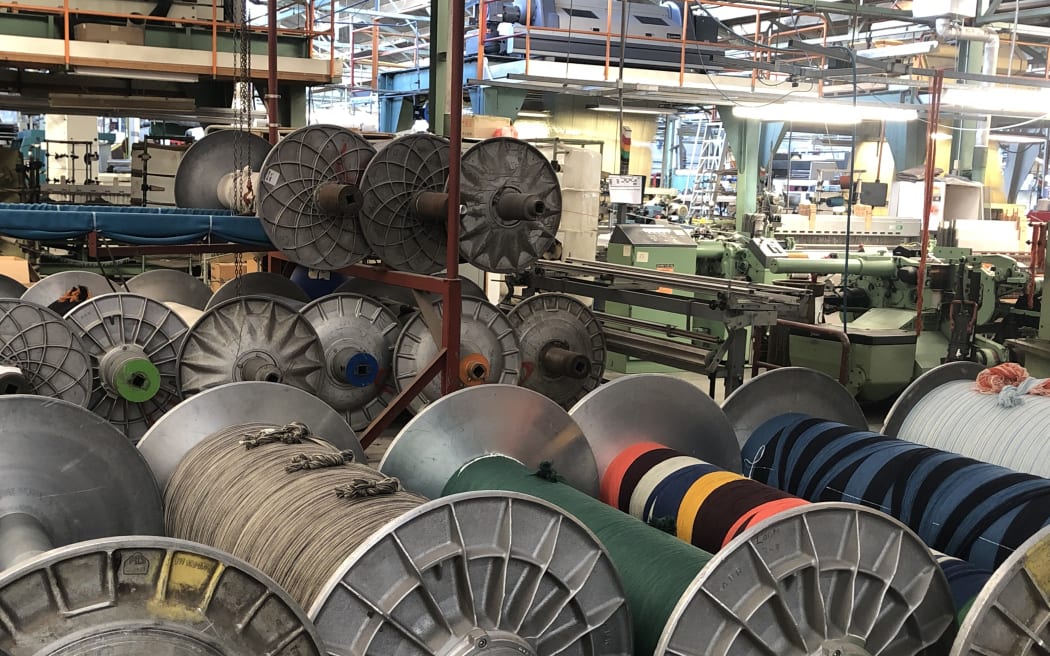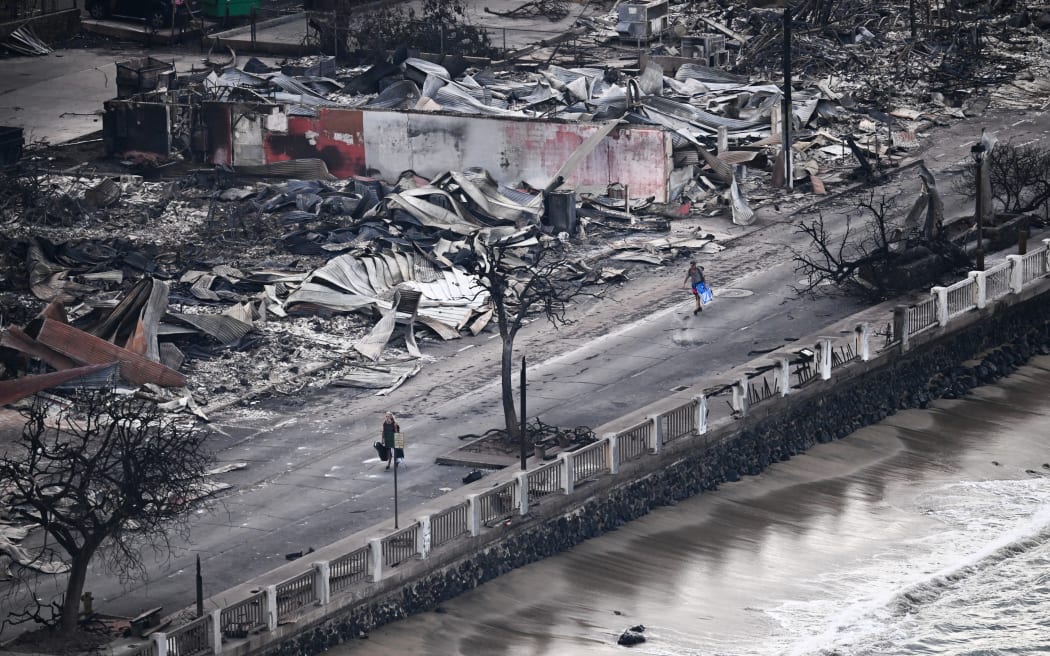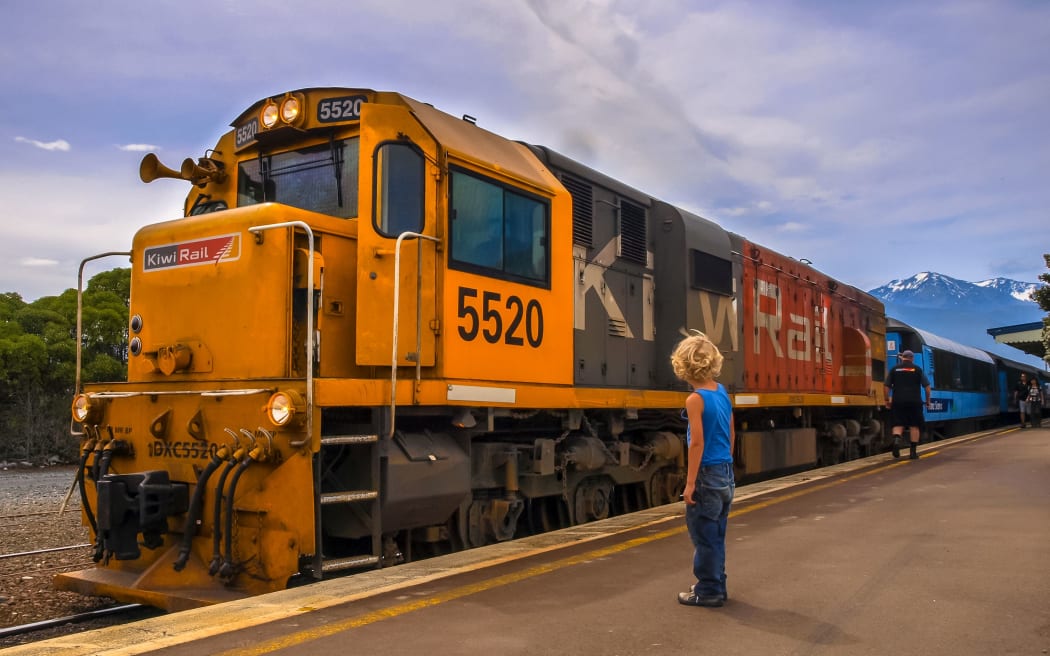Every weekday, The Detail makes sense of the big news stories.
This week, a visit to the last wool weaving factory in New Zealand, the debate over sex education, the threat posed by wildfires this summer, the precarious future of our theatre world, and the growing calls for help from exploited migrant workers.
Whakarongo mai to any episodes you might have missed.
The last NZ company weaving our wool
On one machine, cloth is being dyed in the colours of Air New Zealand for its economy seats, on another is upholstery for Queensland Rail. The cloth on a machine opposite is for a US wholesaler. A jacquard loom is working on blankets with special Māori designs for a small Tauranga firm.

The factory floor at Inter-Weave. Photo: The Detail/Sharon Brettkelly
The country's only commercial wool weaver is busy making all-wool upholstery, throws and fabric for safety-wear for a range of customers.
March has invited The Detail on a tour of the 3500sqm Mt Wellington factory after our podcast about the woes of the industry, when wool broker Philippa Wright said: "find me someone who is making money in the industry and I'll shake their hand".
The business makes money March says, but it's not always easy.
Join Sharon Brettkelly inside InterWeave, New Zealand's last commercial wool weaver.
Who should teach kids about sex and relationships?
Talking to children about sex can be challenging.

Photo: 123rf
Should parents leave it to the experts in the classroom at school, or do they need to take the lead and start those conversations at home?
Tom Kitchin talks to health education expert Dr Rachael Dixon about how sex and relationship education works at school, and sex therapist Nic Beets about how parents and caregivers can best talk to their children about it.
After a summer of cyclones, are we ready for a summer of wildfires?
New Zealanders are still recovering from Cyclone Gabrielle. But the dangers posed by wildfires are yet another in a long list of existential threats attached to living in this country.

An aerial image taken on August 10, 2023 shows a person walking down Front Street past destroyed buildings burned to the ground in Lahaina in the aftermath of wildfires in western Maui, Hawaii. Photo: AFP / Patrick T. Fallon
The Ministry for the Environment and Stats NZ reported in 2020 that New Zealand's fire danger is projected to increase by an average of 70 percent by 2040.
In the northern hemisphere, countless wildfires have started and spread viciously amid a summer of record temperatures – including in Greece, and most recently, in the Hawaiian town of Lahaina.
Sarah Robson and Tom Kitchin speak to University of Tasmania professor of pyrogeography and fire science David Bowman, resident of the wildfire-stricken Lake Ohau village Viv Smith-Campbell, and Scion social scientist Simon Wegner.
Theatre's back, but can it continue to thrive?
Going to a performance at Basement Theatre in Auckland could cost you $5, if you want. Or you could spend $250.
And if you're an artist, you can hire the theatre at no cost.

Cat Ruka, the executive director of Basement Theatre. Photo: The Detail/Sharon Brettkelly
It doesn't sound like a recipe for success, but the non-profit, publicly funded theatre that can be found in a carpark behind Queen Street, is thriving, says the executive director Cat Ruka.
New models of supporting independent artists are being explored in other countries grappling with keeping theatres open. It comes at a time when tertiary education in theatre is being slowly eroded, as cash-strapped universities look for ways of cutting costs, and public funding for theatres is under intense pressure.
Sharon Brettkelly visits Ruka at the Basement, and speaks to Te Herenga Waka Victoria University theatre lecturer James Wenley, who says the country is at a tipping point when it comes to investing in the industry.
Migrant worker advocates alarmed by increasing calls for help
For nearly 14 years, May Moncur has been helping migrant workers from China tackle bad treatment from their bosses. Each case is different, but their grievances are similar: poor pay, long hours, bad working conditions.
But this year, something has changed, says Moncur, an employment law advocate.

May Moncur Photo: The Detail/Sharon Brettkelly
In her small Auckland office, she shows The Detail a file drawer crammed with cases from the last six months. On her desk are more piles of cardboard files, all with the same words written on them.
"Never worked, never worked, never worked, never worked," she says, flicking through them.
They are the cases of migrant workers who have arrived in New Zealand on Accredited Employer Work Visas, after paying thousands to an agent, thinking they were coming to a good job and a better life.
Sharon Brettkelly speaks to Moncur, Mandeep Singh Bela from Union Network of Migrants, and immigration lawyer Alastair McClymont.
Long Read: The new Golden Age of rail
This is The Detail's Long Read – one in-depth story read by us every weekend.

A train journey emits approximately one-sixth of the greenhouse gases of an equivalent plane trip. A six-carriage electric train takes an estimated 625 cars off the road. Photo: 123RF
This week, it's Back on track: The new Golden Age of rail, written and read here by North & South magazine's junior staff writer Theo Macdonald.
You can read the full story in the August issue, or on the North & South website.
Long-distance rail travel is in for a revival in New Zealand — eventually. And you don’t have to be a nostalgia buff, trainspotter or climate-action protester to see why.
Check out how to listen to and follow The Detail here.
You can also stay up-to-date by liking us on Facebook or following us on Twitter.

Photo:


